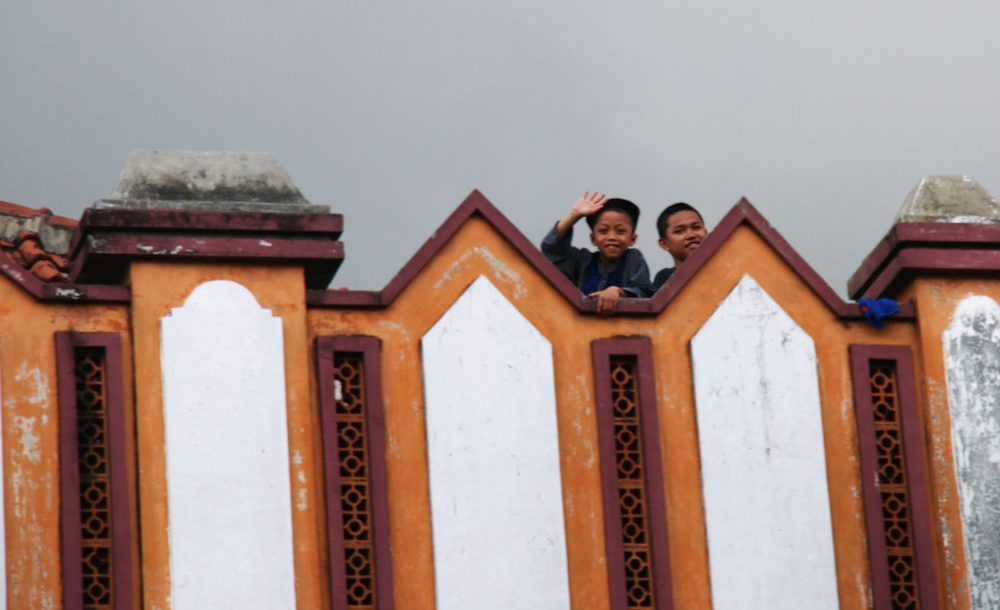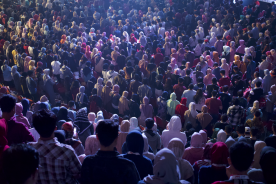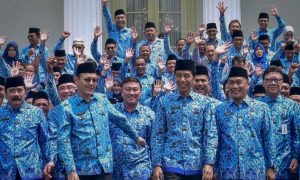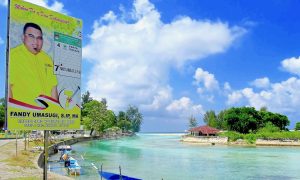“Ulama have been treated like bay leaves (daun salam) during elections. Our mothers usually use bay leaves when cooking to make food smell delicious. But once the meal has been prepared, the bay leaf is the first thing to be thrown away”—Ma’ruf Amin
During visits to pesantren (Islamic boarding schools) in Java and Sumatra, President Joko Widodo’s (Jokowi) running mate Ma’ruf Amin conveyed that metaphor many times in his speeches. “Pak Jokowi is not someone who treats ulama like a bay leaf,” said the former supreme leader of Indonesia’s largest Islamic organisation, Nahdlatul Ulama (NU).
In an attempt to defuse Islamist attacks by winning over NU’s support, Jokowi has relentlessly tried to secure voters in pesantren, NU’s backbone. He managed to shift NU and pesantren leaders who had in 2014 supported his opponent Prabowo Subianto. Significantly, Jokowi devised pesantren empowerment programs in the form of vocational training centres and microcredit schemes. Jokowi has also promised to expedite the passage of the Pesantren Bill, which would increase the legal recognition of pesantren. Media reporting also suggests that fewer pesantren have openly declared their support for Prabowo today than in the lead-up to the last election five years ago.
My observations, made during recent visits to several big pesantren in East and Central Java, confirmed this national trend. In one week I travelled to two pesantren in Kediri (Lirboyo and Al-Falah Ploso), three in Jombang (Tebuireng, Bahrul Ulum Tambakberas, and Mambaul Maarif Denanyar), one in Magelang (Tegalrejo) and one in Yogyakarta (Al-Munawwir Krapyak) to interview ustadz (teachers) and santri (students) about how the election is playing out in these communities.
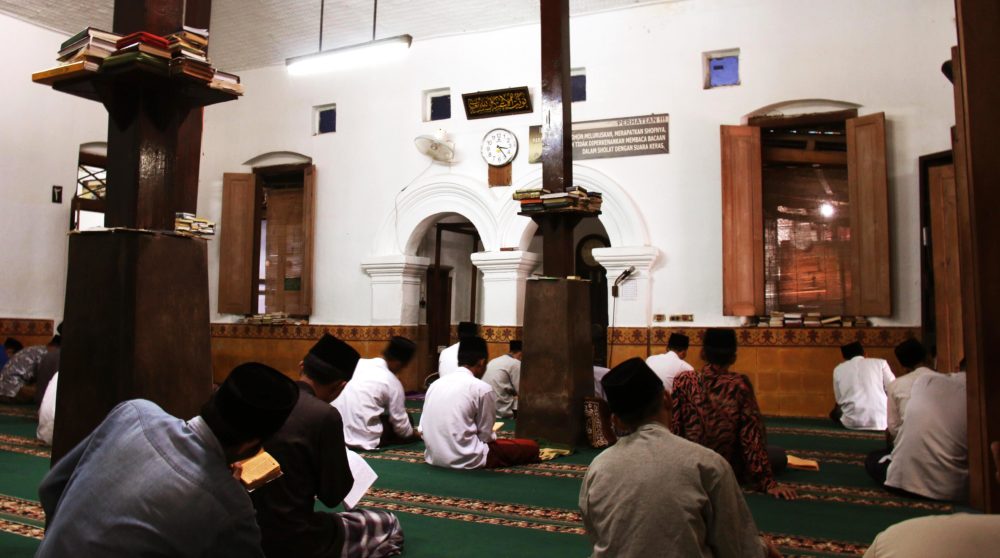
A musalla (place for prayer and learning) in Pesantren Lirboyo (Photo: author)
Ideology, patronage, economics
Many big pesantrens—home to thousands of santri—which have previously endorsed Prabowo have now shifted to supporting Jokowi, thanks partly to the nahdliyyin (NU followers)-based parties, the National Awakening Party (PKB) and the United Development Party (PPP). PPP in particular has played a key role in influencing major pesantren in Madura, as well as Pesantren Al-Anwar in Rembang, Central Java, whose charismatic kyai (Islamic scholar), Maimun Zubair, is PPP’s spiritual leader.
For its part, PKB recently mobilised two big pesantren in Kediri, East Java, (Pesantren Lirboyo and Pesantren Al-Falah Ploso) to instruct their alumni and santri to vote for Jokowi. There are individual kyai or gus (a Javanese title for a kyai’s son) who are openly supporting Prabowo from big pesantren in East Java, such as Pesantren Tambakberas Jombang, Pesantren Tebuireng Jombang, Pesantren Sunan Drajat Lamongan, and Pesantren Sidogiri Pasuruan. These pro-Prabowo kyai’s stances, however, don’t represent the official position of their respective pesantren or the majority of pesantren leaders. Indeed, some of the prominent nahdliyyin who are supporting Prabowo come from the conservative Garis Lurus (the Straight Path) faction within NU.
In their public statements, pesantren leaders who declare their support for Jokowi cite reasons that echo those of NU’s national executive (PBNU) concerning ideology. While PBNU chairman Said Aqil Siradj stated that “the conscience of nahdliyyin would be called upon to vote for Jokowi” considering that “extremist, radical groups” are on the other side, a prominent kyai from Kediri said that with Ma’ruf Amin at Jokowi’s side the president “will defend the Sunni Islam a la NU”. Concerns that Prabowo may re-legalise Hizbut Tahrir Indonesia (HTI) have also featured in nahdliyyin discussions this election.
Apart from religious ideology, patronage and the charismatic influence of kyai seem to be further factors at the lower level. I spoke with santri in pesantren in Kediri and Jombang, East Java, who said they would vote for whichever presidential candidate their kyai endorsed. This includes pesantren where the leaders’ endorsements are split between the two candidates, such as in Pesantren Al-Anwar and Pesantren Tambakberas: santris who study under the kyai who support Prabowo told me they would vote for the presidential challenger.
Given this situation, the presidential candidates’ visits themselves may not be very effective. Prabowo’s running mate Sandiaga Uno, for example, visited Pesantren Al-Falah and promised a ”Santripreneur” program, but the pesantren’s kyai still supports Jokowi. An ustadz in Pesantren Lirboyo told me, “Our kyai were supporting Prabowo five years ago, and he won in the polling stations in this pesantren. Now, our kyai have shifted to Jokowi. I haven’t seen any Lirboyo santri who openly voice support for Prabowo. I believe santri would obey their kyai’s instruction. Perhaps only a few alumni would do otherwise.”
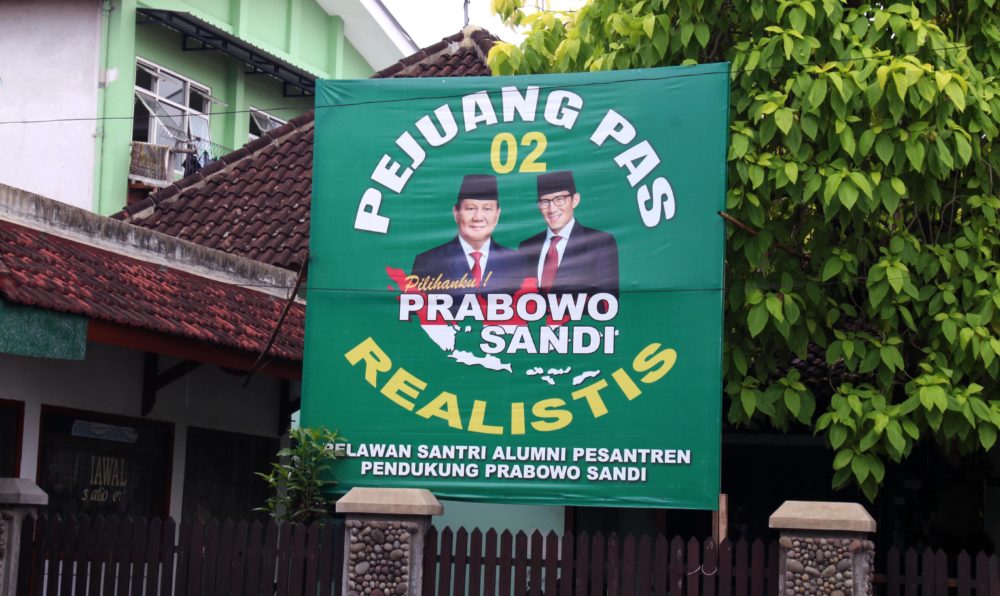
“Pesantren Alumni and Santris’ Voluntary Supporters of Prabowo Sandi” — a banner in front of Pesantren Tebuireng’s gate in Jombang. (Photo: author)
For some santri, Jokowi’s increasing recognition of and aid for pesantren is another reason to support him. The Jokowi administration has promised to pass the Pesantren Bill (RUU Pesantren) soon, which will increase the legal recognition of pesantren by giving them official registration in the Ministry of Religious Affairs, making them eligible for government financial aid. “With the bill, pesantren will have a legal basis, most importantly for having allocation in the state budget,” declared Jokowi in his visit to Pesantren Tambakberas, Jombang. But the bill comes with a caveat. An ustadz in Pesantren Al-Falah, Kediri, said to me, “I was once invited with other pesantren teachers to discuss the bill. We basically saw it as something positive from the government. But with one important note: it must not interfere with pesantren’s curriculum and cultural identity.”
Jokowi has made optimal use of his incumbency to devise programs under the banner of “pesantren empowerment”. With funds from the National Alms Agency (Baznas), facilitated by the Financial Services Authority (OJK), ten Sharia Micro-Finance Institutions (LKMS) were quickly approved for ten NU pesantren across Java in late 2017; as of February 2019 there are 41 LKMS registered with OJK. Jokowi also mandated the Ministry of Manpower and Transmigration (Kemenaker) to establish Vocational Training Centres (BLK) in pesantren: 50 such centres were established in 2018, and there are 500 centres as of March 2019. Jokowi promised to build 1,000 more this year. Elsewhere, the NU Central Board was appointed a partner in a corn production program from the Ministry for Agriculture and received Rp1,5 trillion (A$150 million) in credit from Ministry of Finance. In 2018, the Ministry of Finance’s Endowment Fund for Education (LPDP) launched the “Santri Scholarship” scheme.
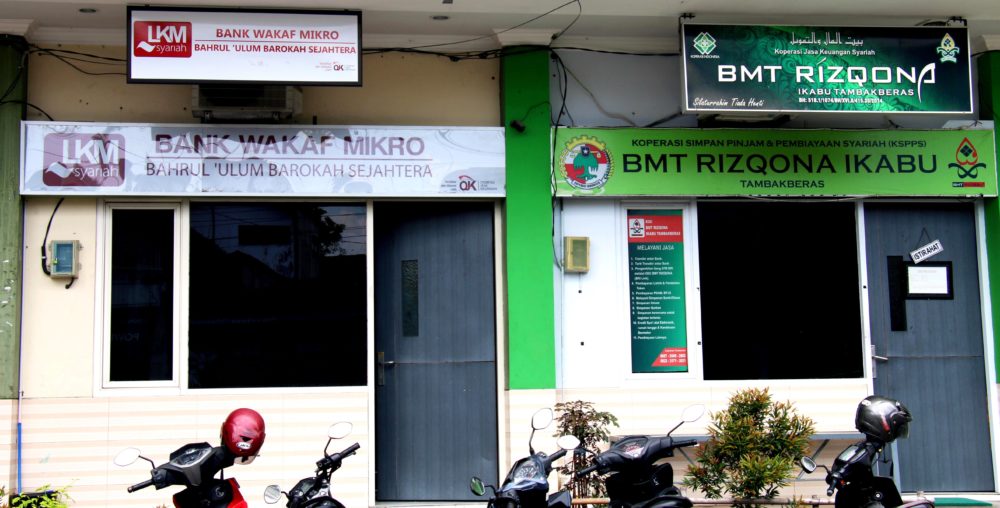
An LKMS, also known as Bank Wakaf Mikro, in Pesantren Bahrul Ulum, Tambakberas, Jombang, East Java. (Photo: author)
Sharia micro-finance institutions (LKMS) and vocational training centres (BLK) have generally worked well and are welcomed positively in pesantren. Take the example of Ahmad,* a santri who can learn automotive skills through a pesantren–based training program in Kediri. Or Fatima,* who can expand her laundry business thanks to a micro-loan from a pesantren in Jombang. Ali,* a santri in Yogyakarta, is now able to continue studying his master’s degree with the Santri Scholarship.
Despite the small amounts of funding compared to other government financing schemes, and an acknowledgement that these programs are part of Jokowi’s manoeuvre to secure santri votes, what matters for most santri is that these programs have helped those from less fortunate families. Pesantren have long offered an alternative for affordable education for Muslims unable to access the state system, but they often lack sufficient facilities by modern educational standards. Many pesantren still maintain their salaf (or ancestral) cultural identity by maintaining classical curriculum and ways of learning—which means, among other things, opting out of formal schooling. In Pesantren Lirboyo, for example, around 20,000 of its 28,000 santris do not attend formal education or university. Some of Jokowi’s initiatives, such as the BLK scheme, are aimed at introducing more skills training as part of a pesantren education. “Dozens of santris have now registered to BLK and received training on computer skills,” a Pesantren Lirboyo ustadz told me.
If there is a notable worry, it was about these programs’ continuation with the re-election of Jokowi. A santri co-manager of a pesantren–based Sharia Micro-Finance Institution (LKMS) in Yogyakarta told me, “OJK [the financial regulator] assured us that LKMS will continue operating regardless of who will be the next president. But what about [training centres] that are under the responsibility of Kemenaker [the labour ministry]? Its current minister is from NU–based party PKB. What if the next minister is not from NU? What if ministers from PKB later have problems with the Corruption Eradication Commission [KPK] like PPP chairman Romahurmuzy?”
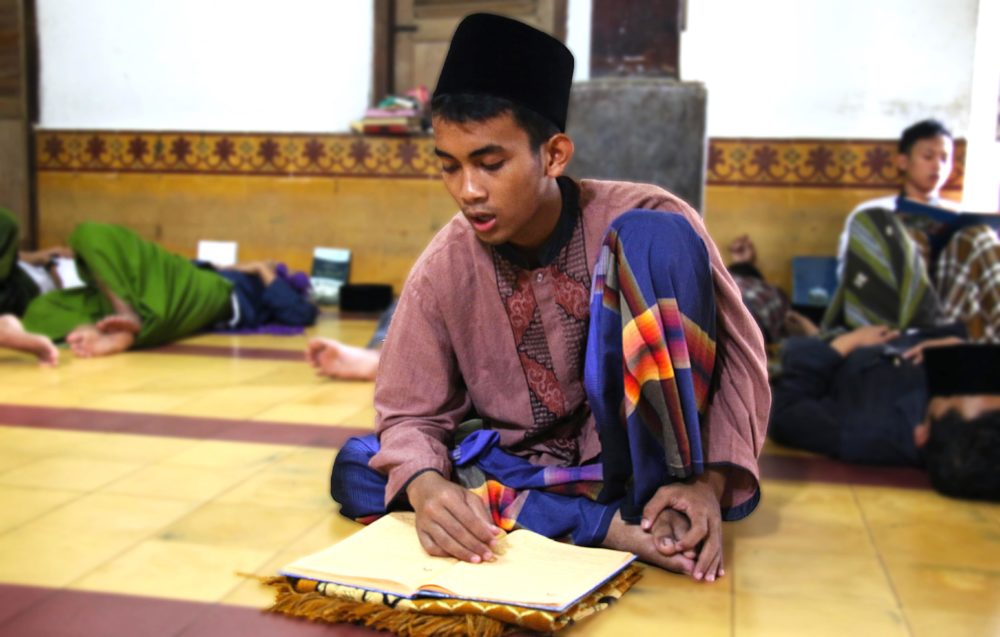
A santri is memorising in preparation for academic year end’s final exam this evening in Lirboyo. (Photo: author)
Disagreements
Behind the government’s financial aid, however, there is serious concern among pesantren leaders about NU’s status as a civil society organisation and its politicisation during the elections. Komite Khittah NU, a group of nahdliyyin led by descendants of NU founders and some pesantren leaders, has voiced criticism that the NU Central Board (PBNU) has involved NU in politics too much, which they consider in breach of NU’s khittah (or party line) that it should maintain its role as a “socio-religious organisation” (jam’iyyah diniyyah ijtima’iyyah) and stay out of “practical politics”.
How ‘moderate’ are Indonesian Muslims?
The numbers on how Indonesia stacks up in comparison to other Muslim-majority countries.
The issue of the NU’s politicisation has indeed always featured during successive elections. But some pesantren leaders don’t see an issue with kyai declaring support for certain candidates. Several santri told me that kyai’s silence might drive nahdliyyin to vote for an undesirable political candidate. An ustadz in Pesantren Al-Falah even gave a religious justification: “We in pesantren often cite Imam al-Ghazali [a 12th-century scholar highly revered in NU community] who said, ‘al-mulk wad-din taw’amani’—ruling power and religion are two twin brothers. Religion is the foundation, while the sultan is the caretaker. Anything without foundation will perish, anything without caretaker will vanish.”
However NU’s khittah should be redefined, it is up to nahdliyyin to decide the exact line NU will take in practical politics. Nonetheless, the 2019 elections illustrate the increasingly blurred lines between the state and civil society, which to some calls into question NU’s critical independence. The Nahliyyin Front for Natural Resources Sovereignty (FNKSDA), for instance, is a leftist group of nahdliyyin advocating for the rights of farmers and villagers whose lands have been acquired by the government for massive infrastructure projects, such as the farmers in Kulonprogo, Yogyakarta, who refused to sell their land for a new airport. They argued that, with a former NU supreme leader in government leadership, NU will have difficulty criticising government’s policies. A leader of FNKSDA will abstain from voting (golput) and has stated:
“The moral burden and sins that santri will bear will be heavy if Jokowi is re-elected, keeps carrying out pro-investor political agenda and policies, is still fond of mining and dirty energy [companies]—as key players in this business are military generals, and maintain infrastructure policies that are greedy for natural resources and land grabbing, while Kyai Ma’ruf is helpless against Luhut, Rini Soemarno, and investors within Megawati’s and Jokowi’s circle.”
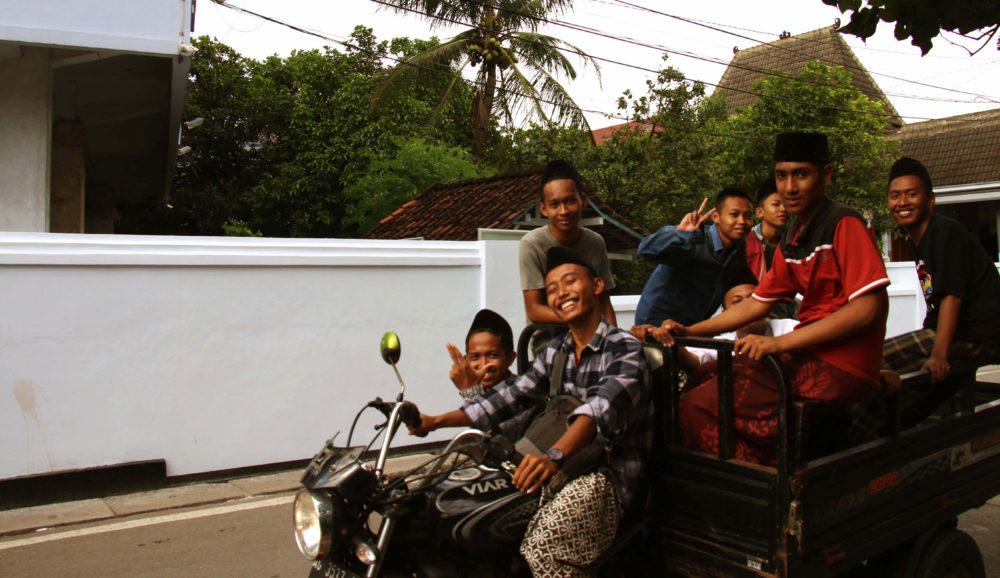
Santris in Pesantren Lirboyo, Kediri, East Java. Their signalling fingers have nothing to do with politics. (Photo: author)
Maintaining authority
Whatever the result of the election, the authority of pesantren are now being challenged by the rise of social media savvy young preachers, some of whom were not trained in pesantren. This broader trend will eventually determine the role of pesantren in society at both the political and religious level.
At the political level, some of the questions about the possible fragmentation of religious authority among Indonesian Muslims will be answered by the election outcome. It will be a test to see to what extent PBNU’s and pesantren leaders’ overt endorsement of Jokowi will be followed by nahdliyyin. For example, Prabowo won by a landslide in Madura in 2014; now prominent Madura kyais have declared their support for Jokowi. Madura will thus be one of the most interesting cases in seeing how much traditional ulama authority still matters in politics. Results from polling stations (TPS) within or near pesantren will be worth observing.
While the vote-getting power of pesantren and their future role in society remains to be seen, Jokowi’s courting of pesantren leaders may mean that, if he is re-lected, Jokowi would have to be careful not to enact policies that go against the ideological views which dominate at the NU grassroots. Some of these views may be categorised as “conservative” from a liberal perspective. But some pesantren communities have been at the forefront of countering the intolerant Islamic discourses that are gaining ground in many parts of the Muslim community. Participants at the latest NU National Conference (Munas) in West Java called for Muslims to refrain from using the word kafir to address non-Muslims during NU’s bahtsul masa’il, a discussion forum where kyai and santri debate religious matters. Pesantren Lirboyo’s latest publication on its own bahtsul masa’il posed the view that the fiqh (Islamic jurisprudence) ruling for guarding churches during Christmas celebrations, alluding to those conducted by NU’s paramilitary youth Banser, is fard al-kifayah or a communal duty, and the whole community bears the sin if it is not undertaken.
Jokowi’s alliance with NU, then, will have varied effects on the policies he might pursue in a second term. Much will depend on whether the incoming NU national leadership (PBNU), which will be chosen in NU’s National Congress in 2020—and which will no longer be chaired by Said Aqil—will maintain the current PBNU’s ideological direction and strong ties with pesantren leaders. And most importantly, whether a future Jokowi presidency doesn’t treat NU and pesantren as an electoral bay leaf.
 Facebook
Facebook  Twitter
Twitter  Soundcloud
Soundcloud  Youtube
Youtube  Rss
Rss 